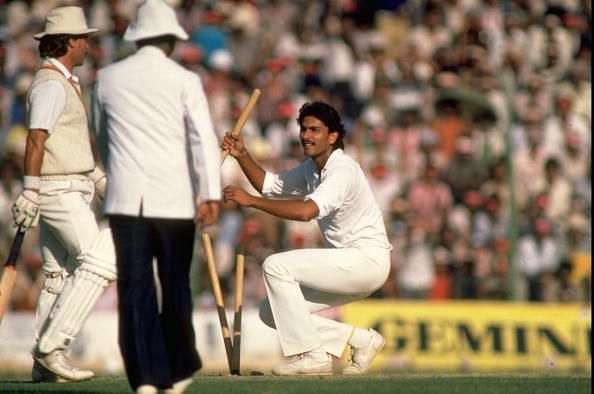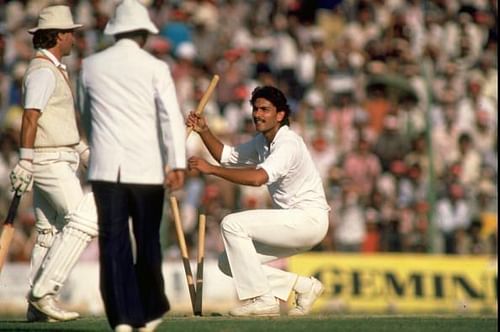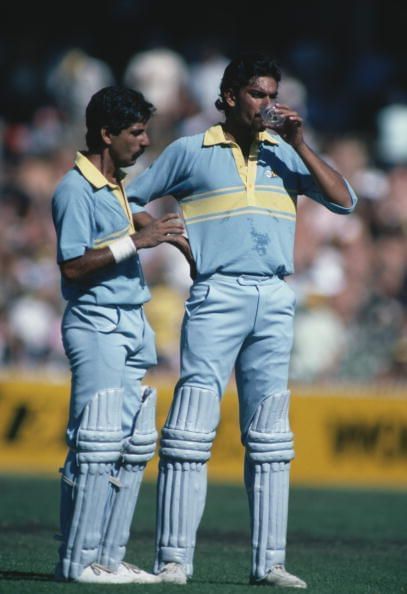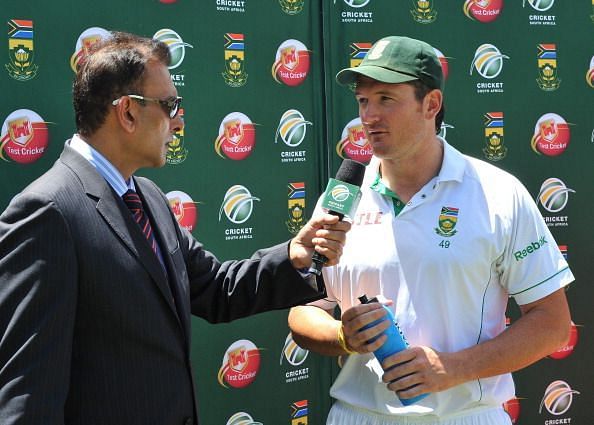
A man of many parts: decoding Ravi Shastri

He was a right-handed batsman but used his left arm to bowl orthodox off-spin. A player who started out predominantly as a bowler and as a lower-order batsman, played mostly at number 6, but excelled as an opener. A man who displayed a staid defensive batting style, but also won a player of the tournament award in an ODI World Championship and holds a joint record for scoring six 6's in an over.
He captained India in just a solitary Test in 1987, ostensibly because of not being a "Yes Man" in the eyes of the Indian cricket board (BCCI) but later played a long stint as a commentator and is now head coach, both roles requiring the blessings of the same board.
Such are the contrasts and contradictions both on and off the field in the career of this charming, fiery, outspoken, candid, and jingoistic cricketing personality.
Young Turk
He is known to never back down, engaging in verbal duels when doing television commentary or slamming his detractors in his current role as head coach.
In an interview, Ravi Shastri admitted that on one occasion as an under-19 captain, he was caught drinking beer in his dormitory room, which of course was forbidden. When confronted by the warden who wanted to confiscate the bottle, young Shastri asked the warden to wait, poured out the remaining beer and then asked the warden to proceed.
When summoned by the secretary of the board to be questioned about this incident, Shastri defended himself saying he drank with his father whom he respected a lot and therefore wasn't doing anything wrong. The incident, no doubt, gives a peek into the psyche of a man who has believed in speaking his mind and played with aggression on the field and off it.
Champion of Champions

"India's Thunder Down Under," screamed the newspaper headlines a day after Sunny Gavaskar's side beat Pakistan in the final to lift the World Championship of Cricket in Australia. It was a comprehensive victory establishing India's growing prowess in the One Day format and silencing critics who chose to attribute India's 1983 World Cup to luck.
Instrumental in the victory was Ravi Shastri, opening batsman and left arm spin bowler. Playing a key all-round role with great opening stands with Krishnamachari Srikkanth and economical spin bowling to frustrate the opposition batsmen, Ravi Shastri won the man of the tournament, or what the tournament organizers called "Champion of Champions."
Staid batsman with record for six sixes
Starting out at number 10, moving to opener and having played in almost every position in between, Ravi Shastri has achieved something very few batsmen have. Yet, history will remember him for his staid batting contrasting with some sudden, occasional explosive bursts.
In a display of excessively sluggish scoring against England, he faced 112 balls to score 57 in a 1992 World Cup match. Finally, he was run out in an embarrassing fashion after Phil DeFraitas dropped a catch but managed to hit the wickets with Shastri out of the crease. India lost the match by 9 runs and no doubt Shastri's snail-paced innings played a part.
In the third test against England at the Eden Gardens (played from December 31, 1984 to January 5, 1985) Ravi Shastri scored a century. He was painfully slow in doing so, however, being at the crease for 455 minutes and facing 357 deliveries!
In stark contrast, a week later in a Ranji Trophy match, playing for Bombay against Baroda, he hit six 6's in over to equal Sir Gary Sobers' first class record.
Wielding the microphone

After his career as a player was cut down due to injury, Ravi Shastri took up commentary for television. He made his mark soon and became a regular sharing the mic with seasoned voices like Tony Greig, Geoffrey Boycott, and Ian Chappell to name a few. He was also the favorite for doing the pre-match interview during the toss ...and the post-match presentation ceremony in his typical style, exuding high energy and great charm.
An eloquent commentator whose voice has become synonymous with cricket in India, Shastri often used cliches. No doubt, all of us have heard some of these more than a few times, Ravi Shastri's oft-used like phrases like "up goes the finger", "edged and taken", and the infinitely used "that went like a tracer bullet to the fence."
While fans love these expressions and his diction, critics cite repetition and lack of originality in his commentary. Yet, along with Harsha Bhogle and Sunil Gavaskar, Ravi Shastri's voice has become synonymous with cricket in India.
The glamour boy of Indian cricket had his first stint on television way back in 1987 with a show called "That's Cricket" aired on Doordarshan. Years later, he was also part of the "Shaz and Waz Show" alongside Wasim Akram.
Shastri as captain
He was the captain of his school cricket team, captain of an India under-19 team, and captain of Bombay who won the Ranji Trophy under him. So it was widely expected that Shastri would lead India, especially after he was appointed vice-captain in 1985. Contrary to expectations, however, Shastri was appointed captain for just a single Test in 1987 after regular skipper Dilip Vengsarkar was injured. He was never to captain India again.
In several interviews since, when asked about the captaincy issue and why he was never appointed as a regular captain, Ravi Shastri has always come down heavily on the cricket board saying that during his playing days, the BCCI always preferred a "Yes Man" to be captain and because he always spoke his mind and refused to back down, he was not considered a suitable candidate for the job.
How then, did the man who was not considered suitable to be a regular captain during his playing days be made head coach by the same governing body? After all, commentators too did lose their jobs because of not following the cricket board's guidelines and Ian Chappell refused to sign a contract with the BCCI saying it amounted to gagging and that he did not wish to a part of commentary team where he could not air his views freely.
The post of head coach of the Indian cricket team therefore does need to be endorsed by the board and that is beyond doubt. Therein, lies the contradiction. Unless, either the BCCI has changed over the years, or Ravi Shastri has.
Cricket analysts in India and around the world have voiced vastly contrasting opinions about whether Ravi Shastri as the coach is a good thing for Indian cricket or not and whether the bonhomie between the skipper and the coach would lead to a new power center that would lead to unhealthy results.
Aggressive captain in sync with aggressive head coach
Cricket has long ceased to be a gentleman's game. England's de facto national sport, an engaging spectacle, played on manicured lawns in the English countryside watched by elegantly dressed ladies in large picture hats over cups of tea and sandwiches, has undergone nothing short of a transformation.
The genteel nature of the game has eroded over the years with a growing propensity among the players to sledge, stare, and use objectionable language on the field much to the dismay of old-timers.
In keeping with the times, Indian cricket too has adopted an aggressive stance both on and off the pitch with both captain and coach believing that "fighting fire with fire" is the best way forward. So, with a fiery captain and an equally fiery coach both of whom do not believe in holding back or giving an inch, India are currently number 1 in the ICC Test and ODI Rankings.
Results are what matter the most and actions, no doubt, speak the loudest. So, as India find themselves 3-0 ahead against South Africa which is an unassailable lead in the ODI series, Ravi Shastri's position as coach seems just as well entrenched as his position as commentator was. As an Indian cricket fan, you may choose to like or dislike him but ignoring him is simply not an option and looks likely to remain so in the foreseeable future.
Destiny, it seems, had its way and it is perhaps for the best that the man whose captaincy was restricted to a lone Test match should return to Indian cricket as guide and mentor.